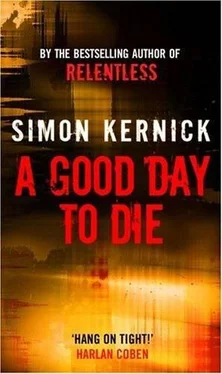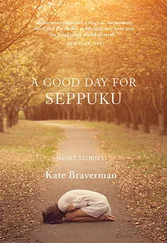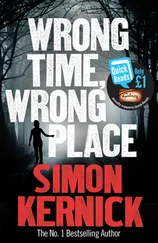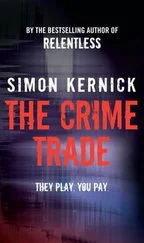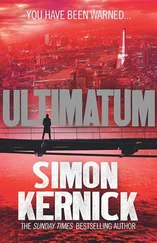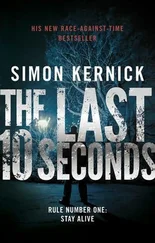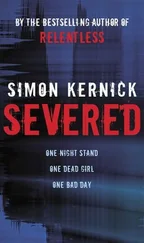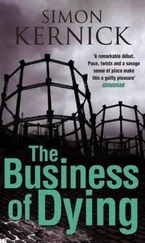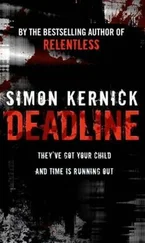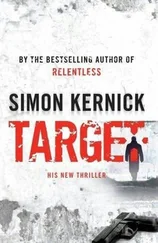Simon Kernick - A Good day to die
Здесь есть возможность читать онлайн «Simon Kernick - A Good day to die» весь текст электронной книги совершенно бесплатно (целиком полную версию без сокращений). В некоторых случаях можно слушать аудио, скачать через торрент в формате fb2 и присутствует краткое содержание. Жанр: Триллер, на английском языке. Описание произведения, (предисловие) а так же отзывы посетителей доступны на портале библиотеки ЛибКат.
- Название:A Good day to die
- Автор:
- Жанр:
- Год:неизвестен
- ISBN:нет данных
- Рейтинг книги:3 / 5. Голосов: 1
-
Избранное:Добавить в избранное
- Отзывы:
-
Ваша оценка:
- 60
- 1
- 2
- 3
- 4
- 5
A Good day to die: краткое содержание, описание и аннотация
Предлагаем к чтению аннотацию, описание, краткое содержание или предисловие (зависит от того, что написал сам автор книги «A Good day to die»). Если вы не нашли необходимую информацию о книге — напишите в комментариях, мы постараемся отыскать её.
A Good day to die — читать онлайн бесплатно полную книгу (весь текст) целиком
Ниже представлен текст книги, разбитый по страницам. Система сохранения места последней прочитанной страницы, позволяет с удобством читать онлайн бесплатно книгу «A Good day to die», без необходимости каждый раз заново искать на чём Вы остановились. Поставьте закладку, и сможете в любой момент перейти на страницу, на которой закончили чтение.
Интервал:
Закладка:
Parnham-Jones defended his comments in soothing, thoughtful tones, but with an underlying steel that brooked no dissent, always making a point of addressing the camera directly. Prison, he explained, was the university of crime. Send first-and second-time offenders there and they were not only likely to reoffend but to move on to more serious offences. Far better to ease the terrible overcrowding in the prisons and give them meaningful community-based sentences instead.
To be fair to the guy, he put his point across well, and with the sort of succinctness that TV interviewers love, but you had to wonder how much he really knew about what was going on out there. In my experience, community-based sentences — painting old ladies' houses, cleaning walls of graffiti, drug-treatment programmes — tended to be a bit of a joke. They were badly administered, the criminals often only turned up when they fancied it, and they never felt much like a punishment. I'm not 100 per cent sure that prison's a lot better in terms of turning people away from crime (in the end, criminals commit their crimes knowing full well they're wrong, but not really being too bothered about that fact, so trying to rehabilitate them's a waste of time), but at least when a guy's banged up he's not actually out there thieving, mugging, or whatever. In that sense, whatever the liberals amongst us might say, prison works.
Emma came back in with the spaghetti and a plate of garlic bread and we ate at the table with the TV off.
You get that sense sometimes, or I do anyway, that things are looking up for you, and that the worst is over. In my experience, it's usually followed by a very heavy fall. But as I sat there demolishing Emma's cooking (and it was very good), while quaffing my second can of Fosters, I couldn't help forgetting about my worries.
After we'd finished eating, we cleared away and she put on a CD of Van Morrison's greatest hits. I asked her how she'd got into journalism.
She smiled. 'I've always liked a good story, and I did English at A level, so that was the foundation. Then when I was at sixth-form college, just before our exams, they had a careers fair where representatives from different industries set up stalls in the refectory so that we could go and talk to them. The journalist who came from the local paper was only a couple of years older than me and he was quite nice-looking, so I got chatting to him, we ended up going for a drink, and he got me a job on the paper. I was meant to go away to uni, but I ended up marrying him. God knows why. I think it was because my dad was so against it. He had all these ideas of what career path I should take. He wanted me to become a lawyer, like him.'
'So where's the husband now?'
'We were young and it didn't last, but by then I'd got a taste for the job. After the split, I moved up to town and I've been working here ever since. The money's not fantastic but it gives me independence.'
I wondered why she wasn't on a national newspaper — she certainly seemed to have enough talent — but chose not to say anything, in case I hit a raw nerve. 'And this place? Is it yours?'
She smiled proudly. 'It is. With a little bit of help from my parents.'
Which was typical. You never saw a poor lawyer. 'You need all the help you can get with the prices these days,' I said, or something equally inane.
She asked me how I ended up being a policeman, and I gave her the honest answer: because at one time I'd thought that it was a useful, socially acceptable job, and I'd genuinely believed I'd make a difference.
'How did you end up as a hitman?'
I cringed a little when she called it that. It wasn't how I saw myself, somehow. 'Is this an interview?'
She shook her head, her expression one of genuine interest. 'No, it isn't, but I would like to know.'
I thought about the answer for a long time, and as I mulled it over I lit a cigarette, as if that would somehow make answering easier. At the same time, I also thought about Malik. I pictured him up there in heaven, or whatever the Islamic equivalent was, looking down at me with a mixture of interest and disapproval as he too waited for my answer. I knew that whatever I said would never have been enough to have earned his forgiveness.
'Because I wasn't strong enough, or sensible enough, to say no,' I said eventually, and hoped that Malik would have at least half approved of that.
Emma was unconvinced. 'But why did you decide to kill people for money?'
I sighed. 'I thought when I did what I did that I was doing the world a favour. I thought I was killing people who deserved it.'
'But Dennis, you can't just be a judge, jury and executioner,' she said, with a hint of educated self-righteousness. 'You haven't got the right to decide who dies and who doesn't. No one has. And you're still doing it. Only a few weeks ago, you shot the suspect in the Malik and Khan murders.'
'Slippery Billy? He deserved it. If he hadn't been a murderer, I wouldn't have killed him.'
She paused, unsure, I think, what else to say. I'm not the best person to argue with about the ethics of murder, because I can sympathize with other points of view. In the end, I do what I do; and I've done it because at the time my instincts have told me to. It's no justification, but at least it's a reason, and some people don't even have one of those.
Emma sat forward in the seat and watched me intensely. It was a little disconcerting, but somehow I didn't want her to stop. It felt good to be the centre of attention for once.
'Do you really consider yourself one of the good guys, Dennis?' she said softly. 'Don't you ever worry that you might be just as bad as the people you put down?'
She looked beautiful then; the perfectly rounded features of her pale face amidst the flowing auburn hair, and those big, smiling, hypnotic eyes that seemed to drag you further and further in. And I knew that whatever I replied was going to disappoint her.
In the end, I settled for what I thought was honesty.
'No,' I said simply. We slept together that night.
It just happened. We drank some more, watched the TV, moved off the more difficult subjects (although she tried occasionally to come back to them), and as the evening progressed I'd felt that there was something growing between us. I liked her anyway, and had done since the moment we'd met, but I was also detecting a growing warmth coming back the other way, as if she'd finally accepted me for who I was and was prepared to stop getting too uptight about it. Or maybe it was just the booze.
I'm no Valentino, and like most men I've had less practice than I would have liked over the years, but after the last of the beer had gone and we were halfway through a bottle of red wine, she'd stood up to go into the kitchen for something, and I'd followed her in there. She'd turned round, sensing my presence, and I'd taken her in my arms and kissed her. For a second she hadn't reacted and I'd thought that maybe my confidence in my own charm was misplaced, but then she'd kissed me back — hard and with passion — and a few minutes later, still entwined in each other's arms, we'd danced and stumbled our way up the stairs and into the bedroom, clothes strewn behind us. I'd wondered briefly what the hell I was doing; then, as we fell on the bed and she giggled as I kissed her neck and tugged at her underwear, I'd ceased caring.
Afterwards we lay naked on the bed and smoked, and I experienced a peculiar feeling of detachment, as if somehow I wasn't there and it hadn't really happened. I listened to the sounds of the night — the cars humming faintly past on the main road, the occasional drunken shout from somewhere in the distance — and tried to relax and enjoy the moment. I let my fingers drift down to her belly, pale and flat in the perma-glow of the city's lights, but all the time my instincts were talking to me, trawling back through the many dark experiences of my life and predicting the winding, uncertain path of my short-term future.
Читать дальшеИнтервал:
Закладка:
Похожие книги на «A Good day to die»
Представляем Вашему вниманию похожие книги на «A Good day to die» списком для выбора. Мы отобрали схожую по названию и смыслу литературу в надежде предоставить читателям больше вариантов отыскать новые, интересные, ещё непрочитанные произведения.
Обсуждение, отзывы о книге «A Good day to die» и просто собственные мнения читателей. Оставьте ваши комментарии, напишите, что Вы думаете о произведении, его смысле или главных героях. Укажите что конкретно понравилось, а что нет, и почему Вы так считаете.
